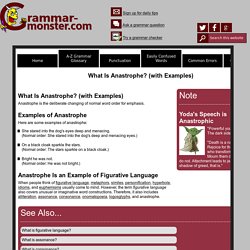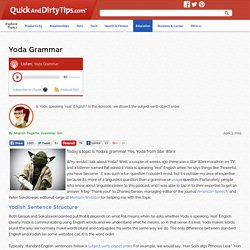

What Is Anastrophe? Anastrophe is the deliberate changing of normal word order for emphasis.

Here are some examples of anastrophe: She stared into the dog's eyes deep and menacing. (Normal order: She stared into the dog's deep and menacing eyes.)On a black cloak sparkle the stars. (Normal order: The stars sparkle on a black cloak.)Bright he was not. (Normal order: He was not bright.) When people think of figurative language, metaphors, similes, personification, hyperbole, idioms, and euphemisms usually come to mind. English in the world today - OpenLearn - Open University - U214_1. IDEA International Dialects of English Archive. Travel - How to speak like a true Brit.
English Dialects: The UK - UR Skola. Speak like a local infographic from Citybase Apartments. Speak like a local – The essential guide to understanding British Slang For a little country that’s around 40 times smaller than the USA its amazing how much local dialect and slang terms vary across the UK.

Overflowing with local accents and sayings – words can quite literally change meaning if you drive a few miles up or down the road. With each city having its own slang terms it can be quite daunting to understand the different meanings. But never fear, there’s no need to be a dunderhead or a nawse – Citybase have travelled the length and breadth of the country covering Weegie words in Glasgow, Geordie phrases from Newcastle, Scouse sayings in Liverpool, Brummie lingo from Birmingham and Cockney slang in London. So, whether you and your fella are having a few bevvies in Scouse-land or your heading to London Town to have a bubble bath with your china plates our guide to British slang will have you speaking like a local in no time. 28 August 2013: Oxford Dictionaries Online quarterly update: new words added to oxforddictionaries.com today. 28 August 2013, Oxford, UK Today Oxford University Press announces the latest quarterly update to OxfordDictionaries.com Online (ODO).

Culture - Why does Britain have such bizarre place names? The drive from the town of Much Wenlock to Ashby-de-la-Zouch is 60 miles east across the English Midlands.

Once you have crossed the River Severn and passed the Wrekin rising to the left – the last of the Shropshire Hills – you join the M54 at the Wrekin Retail Park. At Featherstone, you have a choice: north and then east past Lichfield and Tamworth, or southeast past Walsall, Wednesbury and Birmingham, south of Sutton Coldfield, and northeast to cross the River Tame.
Either way, once you’re past Appleby Magna and crossing the River Mease, you’re almost there. Be sure not to make a wrong turn and end up in Donisthorpe, Newton Burgoland or Snarestone. And just like that, in an hour and a quarter, you will have covered the great sweep of British history: from the Celts through the Romans, Anglo-Saxons, Scandinavians, and Normans to modern times – all as displayed in Britain’s place names. British history didn’t start with the Celtic peoples (Stonehenge didn’t build itself, after all). Anyone for Quidditch? Quidditch is a sport created by Rowling in the Harry Potter series of novels, which have now sold over 450 million copies and have been translated into 67 languages.

The global popularity of the books has led to worldwide exposure for Quidditch, and even to this fictional sport being adapted for the Muggle (or non-wizard) population. It has also – along with other terms from the series – entered the vocabulary of fans all over the world. Quidditch: a quick introduction So what is Quidditch? In simple terms it can be viewed as a kind of wizard equivalent to football with each team consisting of seven players and four balls: the Quaffle, two Bludgers, and the Golden Snitch.
Etymologies: fact or fiction? Rowling drew inspiration from many sources – such as mythology and Latin – in naming the characters and places of the Harry Potter series, but with Quidditch she went a step further. These origin stories show the depth of detail Rowling went into in the Harry Potter series. Lingro: The coolest dictionary known to hombre! Yoda Grammar. Today's topic is Yoda's grammar.

Yes, Yoda from Star Wars. Why would I talk about Yoda? Well, a couple of weeks ago there was a Star Wars marathon on TV, and a listener named Pat asked if Yoda is speaking "real" English when he says things like "Powerful, you have become. " It was such a fun question I couldn't resist, but it's outside my area of expertise because it's more of a linguistics question than a grammar or usage question. Fortunately, people who know about linguistics listen to this podcast, and I was able to tap in to their expertise to get an answer. Yodish Sentence Structure Both Carson and Sokolowski pointed out that it depends on what Pat means when he asks whether Yoda is speaking "real" English. Typically, standard English sentences follow a subject-verb-object order. Carson also notes that although Yoda shifts around sentence elements, he doesn't do so randomly.